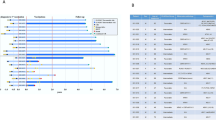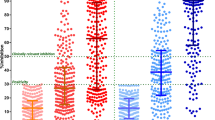Abstract
The aim of this work was to evaluate the long-term immunological and clinical impact of idiotype (Id) vaccination in multiple myeloma (MM) patients in first remission after high-dose chemotherapy. A total of 15 patients received a series of subcutaneous (s.c.) injections of autologous Id, conjugated to keyhole limpet hemocyanin (KLH) and in association with low doses of GM-CSF. The median duration of follow-up was 110 months from diagnosis. The vaccine induced immune responses that lasted almost 2 years after the end of treatment. Antibody responses included anti-KLH IgM and IgG (90% of patients), anti-KLH IgE (30%), anti-GM-CSF IgG (20%), anti-Id IgG (20%), and anti-Id IgE (30%). Id-specific delayed type hypersensitivity skin tests were positive in 85% of tested patients. Following vaccination, a progressive recovery of T-cell receptor (TCR) diversity was observed and the loss of oligoclonality was significantly correlated with the remission duration. Although Id/KLH conjugates did not eliminate the residual tumor burden, the median progression-free survival, and overall survival were 40 and 82 months, respectively. A retrospective case-matched analysis showed similar results in patients treated with IFN-α alone or in association with steroids. This vaccine formulation can overcome Id-specific immune tolerance by inducing clinical responses that are worthy of further investigation.
This is a preview of subscription content, access via your institution
Access options
Subscribe to this journal
Receive 12 print issues and online access
$259.00 per year
only $21.58 per issue
Buy this article
- Purchase on Springer Link
- Instant access to full article PDF
Prices may be subject to local taxes which are calculated during checkout




Similar content being viewed by others
References
Boccadoro M, Pileri A . Diagnosis, prognosis, and standard treatment of multiple myeloma. Hematol Oncol Clin N Am 1997; 11: 111–113.
Bataille R, Harousseau J-L . Multiple myeloma. N Engl J Med 1997; 336: 1657–1664.
Corradini P, Voena C, Astolfi M, Ladetto M, Tarella C, Boccadoro M et al. High-dose sequential chemoradiotherapy in multiple myeloma: residual tumor cells are detectable in bone marrow and peripheral blood cell harvests and after autografting. Blood 1995; 85: 1596–1602.
Mandelli F, Avvisati G, Amadori S, Boccadoro M, Gernone A, Lauta VM et al. Maintenance treatment with alpha-2b recombinant interferon significantly improves response and survival duration in multiple myeloma patients responding to conventional induction chemotherapy. N Engl J Med 1990; 322: 1430–1434.
The Myeloma Trialists' Collaborative Group. Interferon as therapy for multiple myeloma: an individual patient data overview of 24 randomized trials and 4012 patients. Br J Haematol 2001; 113: 1020–1034.
Bjorkstrand B, Svensson H, Goldschmidt H, Ljungman P, Apperley J, Mandelli F et al. Alpha-interferon maintenance treatment is associated with improved survival after high-dose treatment and autologous stem cell transplantation in patients with multiple myeloma: a retrospective registry study from the European Group for Blood and Marrow Transplantation (EBMT). Bone Marrow Transplant 2001; 27: 511–515.
Palumbo A, Giaccone L, Bertola A, Pregno P, Bringhen S, Rus C et al. Low-dose thalidomide plus dexamethasone is an effective salvage therapy for advanced myeloma. Haematologica 2001; 86: 399–403.
Hideshima T, Chauhan D, Shima Y, Raje N, Davies FE, Tai YT et al. Thalidomide and its analogs overcome drug resistance of human multiple myeloma cells to conventional therapy. Blood 2000; 96: 2943–2950.
Treon SP, Pilarski LM, Belch AR, Kelliher A, Preffer FI, Shima Y et al. CD20-directed serotherapy in patients with multiple myeloma: biologic considerations and therapeutic applications. J Immunother 2002; 25: 72–81.
Gemmel C, Cremer FW, Weis M, Witzens M, Moldenhauer G, Koniczek KH et al. Anti-CD20 antibody as consolidation therapy in a patient with primary plasma cell leukemia after high-dose therapy and autologous stem cell transplantation. Ann Hematol 2002; 81: 119–123.
Bjorkstrand B-B, Ljungman P, Svensson H, Hermans J, Alegre A, Apperley J et al. Allogeneic bone marrow transplantation versus autologous stem cell transplantation in multiple myeloma: a retrospective case-matched study from the European Group for Blood and Marrow Transplantation. Blood 1996; 88: 4711–4718.
McSweeney PA, Niederwieser D, Shizuru JA, Sandmaier BM, Molina AJ, Maloney DG et al. Hematopoietic cell transplantation in older patients with hematologic malignancies: replacing high-dose cytotoxic therapy with graft-versus-tumor effect. Blood 2001; 97: 3390–3400.
Badros A, Barlogie B, Siegel E, Cottler-Fox M, Zangari M, Fassas A et al. Improved outcome of allogeneic transplantation in high-risk multiple myeloma patients after nonmyeloablative conditioning. J Clin Oncol 2002; 20: 1295–1303.
Massaia M, Borrione P, Battaglio S, Mariani S, Beggiato E, Napoli P et al. Id vaccination in human myeloma: generation of tumor-specific immune responses after high-dose chemotherapy. Blood 1999; 94: 673–683.
Reichardt VL, Okada CY, Liso A, Benike CJ, Stockerl-Goldstein KE, Engleman EG et al. Id vaccination using dendritic cells after autologous peripheral blood stem cell transplantation for multiple myeloma: a feasibility study. Blood 1999; 93: 2411–2419.
Corradini P, Voena C, Tarella C, Astolfi M, Ladetto M, Palumbo A et al. Molecular and clinical remissions in multiple myeloma: role of autologous and allogeneic transplantation of hematopoietic cells. J Clin Oncol 1999; 17: 208–215.
Martinelli G, Terragna C, Zamagni E, Ronconi S, Tosi P, Lemoli RM et al. Molecular remission after allogeneic or autologous transplantation of hematopoietic stem cells for multiple myeloma. J Clin Oncol 2000; 18: 2273–2281.
Battaglio S, Napoli P, Beggiato E . Development of vaccines against autologous tumor-derived idiotype in human myeloma: rationale and preparation. Minerva Biotechnol 1996; 8: 1–8.
Mariani S, Coscia M, Even J, Peola S, Foglietta M, Boccadoro M et al. Severe and long-lasting disruption of T-cell receptor diversity in human myeloma after high-dose chemotherapy and autologous peripheral blood progenitor cell infusion. Br J Haematol 2001; 113: 1051–1059.
Corradini P, Boccadoro M, Voena C, Pileri A . Evidence for a bone marrow B cell transcribing malignant plasma cell VDJ joined to Cμ sequence in immunoglobulin IgG- and IgA-secreting multiple myelomas. J Exp Med 1993; 178: 1091–1096.
Voena C, Ladetto M, Astolfi M, Provan D, Gribben JG, Boccadoro M et al. A novel nested-PCR strategy for the detection of rearranged immunoglobulin heavy-chain genes in B cell tumors. Leukemia 1997; 11: 1793–1798.
Bergenbrant S, Yi Q, Osterborg A, Bjorkholm M, Osby E, Mellstedt H et al. Modulation of anti-idiotypic immune response by immunization with the autologous M-component protein in multiple myeloma patients. Br J Haematol 1996; 92: 840–846.
Osterborg A, Yi Q, Henriksson L, Fagerberg J, Bergenbrant S, Jeddi-Tehrani M et al. Idiotype immunization combined with granulocyte–macrophage colony-stimulating factor in myeloma patients induced type I, major histocompatibility complex-restricted, CD8- and CD4-specific T-cell responses. Blood 1998; 91: 2459–2466.
Yi Q, Desikan R, Barlogie B, Munshi N . Optimizing dendritic cell-based immunotherapy in multiple myeloma. Br J Haematol 2002, 297–305.
Lim SH, Bailey-Wood R . Idiotypic protein-pulsed dendritic cell vaccination in multiple myeloma. Int J Cancer 1999; 83: 215–222.
Cull G, Durrant L, Stainer C, Haynes A, Russell N . Generation of anti-idiotype immune responses following vaccination with idiotype-protein pulsed dendritic cells in myeloma. Br J Haematol 1999; 107: 648–655.
Titzer S, Christensen O, Manzke O, Tesch H, Wolf J, Emmerich B et al. Vaccination of multiple myeloma patients with idiotype-pulsed dendritic cells: immunological and clinical aspects. Br J Haematol 2000; 108: 805–816.
McNeel DG, Schiffman K, Disis ML . Immunization with recombinant human granulocyte–macrophage colony-stimulating factor as a vaccine adjuvant elicits both a cellular and humoral response to recombinant human granulocyte–macrophage colony-stimulating factor. Blood 1999; 93: 2653–2659.
Ragnhammar P, Friesen HJ, Frodin JE, Lefvert AK, Hassan M, Osterborg A et al. Induction of anti-recombinant human granulocyte–macrophage colony-stimulating factor (Escherichia coli-derived) antibodies and clinical effects in nonimmunocompromised patients. Blood 1994; 84: 4078–4087.
Trojan A, Schultze JL, Witzens M, Vonderheide RH, Ladetto M, Donovan JW et al. Immunoglobulin framework-derived peptides function as cytotoxic T-cell epitopes commonly expressed in B-cell malignancies. Nat Med 2000; 6: 667–672.
Dembic Z, Schenck K, Bogen B . Dendritic cells purified from myeloma are primed with tumor-specific antigen (idiotype) and activate CD4+ T cells. Proc Natl Acad Sci USA 2000; 97: 2697–2702.
Bogen B . Peripheral T cell tolerance as a tumor escape mechanism: deletion of CD4+ T cells specific for a monoclonal immunoglobulin idiotype secreted by a plasmacytoma. Eur J Immunol 1996; 26: 2671–2679.
Soiffer R, Lynch T, Mihm M, Jung K, Rhuda C, Schmollinger JC et al. Vaccination with irradiated autologous melanoma cells engineered to secrete human granulocyte–macrophage colony-stimulating factor generates potent antitumor immunity in patients with metastatic melanoma. Proc Natl Acad Sci USA 1998; 95: 13141–13146.
Gong J, Koido S, Chen D, Tanaka Y, Huang L, Avigan D et al. Immunization against murine multiple myeloma with fusions of dendritic and plasmacytoma cells is potentiated by interleukin 12. Blood 2002; 99: 2512–2517.
Rasmussen T, Hansson L, Osterborg A, Johnsen HE, Mellstedt H . Idiotype vaccination in multiple myeloma induced a reduction of circulating clonal tumor B cells. Blood 2003; 101: 4607–4610.
Frassanito MA, Cusmai A, Dammacco F . Deregulated cytokine network and defective Th1 immune response in multiple myeloma. Clin Exp Immunol 2001; 125: 190–197.
Bendandi M, Gocke CD, Kobrin CB, Benko FA, Sternas LA, Pennington R et al. Complete molecular remissions induced by patient-specific vaccination plus granulocyte–monocyte colony-stimulating factor against lymphoma. Nat Med 1999; 5: 1171–1177.
Massaia M, Borrione P, Attisano C, Barral P, Beggiato E, Montacchini L et al. Dysregulated Fas and bcl-2 expression leading to enhanced apoptosis in T cells of multiple myeloma patients. Blood 1995; 85: 3679–3687.
Brown RD, Pope B, Murray A, Esdale W, Sze DM, Gibson J et al. Dendritic cells from patients with myeloma are numerically normal but functionally defective as they fail to up-regulate CD80 (B7-1) expression after huCD40LT stimulation because of inhibition by transforming growth factor-beta1 and interleukin-10. Blood 2001; 98: 2992–2998.
Acknowledgements
We thank Professor John Iliffe for editorial assistance and Dr Claudia Voena for performing PCR analyses on B and plasma cells. This work was supported by AIRC (Milano, Italy), MIUR (Roma, Italy), Compagnia San Paolo di Torino, Oncology Program (Torino, Italy), and FIRMS (Torino, Italy). CDB is a fellowship recipient of CeRMS, Torino, Italy.
Author information
Authors and Affiliations
Rights and permissions
About this article
Cite this article
Coscia, M., Mariani, S., Battaglio, S. et al. Long-term follow-up of idiotype vaccination in human myeloma as a maintenance therapy after high-dose chemotherapy. Leukemia 18, 139–145 (2004). https://doi.org/10.1038/sj.leu.2403181
Received:
Accepted:
Published:
Issue Date:
DOI: https://doi.org/10.1038/sj.leu.2403181
Keywords
This article is cited by
-
Idiotypic DNA vaccination for the treatment of multiple myeloma: safety and immunogenicity in a phase I clinical study
Cancer Immunology, Immunotherapy (2015)
-
Imaging and radioimmunotherapy of multiple myeloma with anti-idiotypic Nanobodies
Leukemia (2014)
-
Peptide vaccines for hematological malignancies: a missed promise?
International Journal of Hematology (2014)
-
High-dose chemotherapy and autologous hematopoietic stem cell transplantation in myeloma patients under the age of 65 years
Bone Marrow Transplantation (2007)



